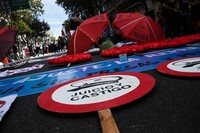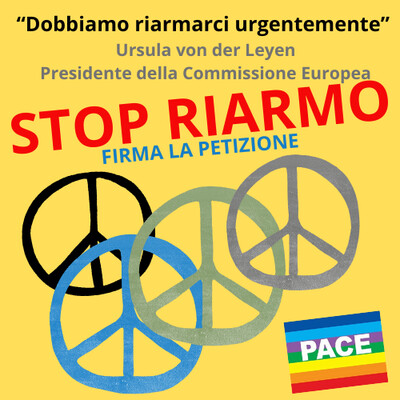Il rapporto 2004 di Amnesty International, selezione di eventi da gennaio ad aprile
Embargo Date: 26 May 2004 09:00 GMT
Amnesty International Report 2004 Updates
Selected events covering the period from January to April 2004
Africa Update
Côte d'Ivoire
The UN Security Council adopted a resolution establishing a UN Operation in Côte d'Ivoire starting on 4 April with a mandate to, amongst others, observe and monitor the implementation of the comprehensive ceasefire agreement of 3 May 2003 and movements of armed groups. Dozens of people were killed by government security forces during and in the aftermath of demonstrations organized by opponents of President Laurent Gbagbo in March 2004. A UN commission of enquiry into the killings noted that security forces and pro-government militias used the march as a pretext for massive arrests without any established legal ground, killing innocent civilians indiscriminately and committing massive human rights violations.
Liberia
Disarmament, demobilization, reintegration and rehabilitation (DDRR) of former combatants, including some 20,000 child soldiers, was hindered by delayed deployment of the full complement of troops of the UN Mission in Liberia (UNMIL) and apparent lack of commitment by some leaders of parties to the conflict. The DDRR only began to get under way in April. At an international reconstruction conference in February, more than US$520m was pledged to meet post-conflict reconstruction and humanitarian assistance over the next two years.
Rwanda
Rwanda and the international community marked the tenth anniversary of the beginning of the 1994 genocide. The last two weeks of April witnessed a series of public declarations and accusations regarding incursions by armed opposition groups from the Democratic Republic of Congo (DRC) into the north-western provinces of Rwanda. There were also a series of public declarations and accusations (by the governments of Rwanda and DRC, and the UN mission in DRC) regarding the re-entry of the Rwandese army into the DRC.
Sierra Leone
The new court-house of the Special Court for Sierra Leone was officially opened in March. Trials are expected to begin in the next few months. Major challenges remain, however, in bringing to justice perpetrators of crimes against humanity, war crimes and other serious violations of international law committed during Sierra Leone's armed conflict. Charles Taylor, indicted by the Special Court last year, continues to be harboured by Nigeria, in violation of its obligations under international law.
Sudan
Negotiations in N'Djamena, Chad, in April, involving the government of Sudan and representatives of the two armed political groups active in Darfur, the Sudan Liberation Army and the Justice and Equality Movement, led to a ceasefire agreement. Despite the ceasefire agreement, Amnesty International (AI) continues to receive reports of attacks by the government-supported militia, the Janjawid, on villages and indiscriminate or deliberate attacks against civilians by the Sudanese air force.
Americas Update
Haiti
An upsurge in violence by armed groups led to the departure, in disputed circumstances, of President Jean Bertrand Aristide on 29 February and a provisional interim government was put in place. Mandated by the United Nations Security Council, a multinational interim force (MIF) was deployed to restore order and the rule of law, to help safeguard human rights and to facilitate humanitarian access. Despite the presence of the MIF, human rights violations continued to be committed by all sides, creating a profound sense of insecurity. Convicted perpetrators of human rights violations, such as Louis Jodel Chamblain and Jean Pierre Baptiste, emerged as leaders of the rebel forces. However, Chamblain has given himself up to the Haitian authorities. Others convicted of, or indicted for, human rights abuses escaped from the National Penitentiary. Extrajudicial executions, attacks and threats against people involved in the convictions of human rights violators have been reported. An AI delegation visited Haiti in March-April 2004. From 1 June a newly established United Nations Stabilisation Mission in Haiti (MINUSTAH) will take over from MIF. The MINUSTAH's mandate includes provisions on disarmament and human rights; however AI is concerned that the short duration of the initial mandate, 6 months, won't provide Haiti the long term international commitment that the country needs.
Venezuela
Violent confrontations between opposition groups, government supporters and security forces between 27 February and 4 March 2004 resulted in more than 14 deaths and 200 people injured. During the disturbances, more than 500 people were detained and a number of reports of ill-treatment and torture were received. Members of the security forces were also reported injured in the frequently violent demonstrations. Subsequent investigations to establish the facts around these alleged abuses and prosecute those responsible have been slow and inadequate. Tensions remain high between government and opposition groups surrounding the referendum process. For the first time, in February, a group of Colombian asylum-seekers was granted refugee status.
Brazil
Denunciations of human rights abuses by security forces and armed gangs were numerous in Rio de Janeiro. These included reports of torture, death in custody, extrajudicial execution and "death squad" activity. Heavy-handed attempts to combat drug trafficking gangs in the city led to continued deaths of civilians at the hands of the police and the recommendation to use members of the armed forces in support of the police. Extensive violence continues to surround the issue of indigenous rights as the federal government has failed to address their plight. Prison conditions continued to be a concern as more than 14 prisoners were killed by inmates in Urso Branco, in the state of Rondonia, in April.
United States
The Supreme Court heard oral arguments in cases of so-called "enemy combatants" held without charge or trial by the executive. The cases involved some of the hundreds of foreign nationals in Guantanamo Bay and two US citizens held on the US mainland. The Court's rulings are expected later this year. There were 24 executions between January and April 2004. In March, the governors of Wyoming and South Dakota signed into law legislation prohibiting the execution of child offenders. Later this year, the US Supreme Court will revisit its 1989 decision that permits the execution of child offenders -- those under 18 at the time of the crime. Several executions scheduled to take place before the end of June were stayed pending the Supreme Court's decision.
Asia Pacific Update
Afghanistan
A new constitution was adopted by the Constitutional Loya Jirga in January 2004. It committed Afghanistan to equality, regardless of gender or ethnicity; to freedom of religion; and to upholding the Universal Declaration of Human Rights and other international treaties and conventions to which Afghanistan is a signatory. AI is concerned at the long-term arbitrary detentions at Bagram airbase and other detention centres run by US military forces. Despite repeated requests, AI has not been permitted to visit detainees at those places and the detainees held there remain in a legal black hole. In late April, the first judicial execution since the fall of the Taleban was reported. Abdullah Shah, a regional commander, was sentenced to death in September 2003 after a trial that clearly violated international standards of fair trial.
Myanmar
Ahead of the National Convention scheduled to be held on 17 May, the State Peace and Development Council (SPDC -- the country's military government) released several political prisoners in April 2004 and permitted the office of the main opposition party, National League for Democracy (NLD), to reopen. However, at least 1300 prisoners of conscience and political prisoners remained imprisoned, 200 of whom on are death row.
Nepal
Since the collapse of the ceasefire in 2003, there has been increased military spending. Combined with the negative impact the conflict has had on the economy, there had been a detrimental effect on the state's ability to deliver on some of its primary responsibilities, such as security, access to health and education.
Vietnam
The lack of protection of the right to life remained a major concern. In a bizarre move, the Vietnamese government, in a decision signed by the Prime Minister on 5 January, made the reporting and dissemination of statistics on the use of the death penalty a state secret.
Bhutan
On a positive note, the King announced the abolition of the death penalty in March 2004.
Samoa
The Parliament abolished the death penalty for all crimes on 15 January 2004.
India
In Jammu and Kashmir, two human rights defenders belonging to the "Coalition of Civil Society" (CCS), Asiya Jeelani and driver Ghulam Nabi Sheikh, were killed during election monitoring activities on 20 April. In January 2004, tens of thousands of activists from around the world gathered in Mumbai for the World Social Forum (WSF).
North Korea
A second round of six-nations talks were organized by China in February 2004 to bring together key states -- the US, Japan, South Korea, Russia and North Korea -- in an attempt to resolve the threat posed by North Korea's nuclear program. The six nations agreed to meet again before June and to start working-level talks in advance of the meeting to discuss the dispute.
New Zealand
Ahmed Zaoui, an Algerian who sought asylum in December 2002, continued to be held in detention as of April 2004 and faces possible deportation because of a national security assessment by New Zealand intelligence services based on secret information. This is despite his being granted refugee status in August 2003.
Europe and Central Asia Update
European Union
The EU admitted 10 new states on 1 May -- the Czech Republic, Cyprus, Estonia, Hungary, Latvia, Lithuania, Malta, Poland, Slovakia and Slovenia. AI has concerns relating to the administration of justice; discrimination against minorities, in particular Roma in some of the new EU member states; and the treatment of asylum-seekers. The EU must address more seriously the issue of observance of human rights within its borders.
Spain
A sequence of bombings inside commuter trains during the early morning rush hour on 11 March in Madrid caused up to 192 deaths and injured over 1460 people. The massacre could constitute a crime against humanity under international law.
Uzbekistan
A series of explosions and attacks on police checkpoints in Tashkent and the city of Bukhara took place between 28 March and 1 April 2004. Uzbek authorities blame the violence, which left over 40 people dead, on "Islamic extremists" -- in particular a small Islamist group called Jamo'at said to have links with the banned armed group, the Islamic Movement of Uzbekistan (IMU), and the Islamist opposition party Hizb-ut-Tahrir, whom the authorities accuse of intending to destabilize the country.
UK
In March 2004, a Libyan man, known as M, was released from a London high security prison after the Special Immigration Appeals Commission (SIAC) ruled that the case for detaining him as a "suspected international terrorist" was "not established". He was one of the 14 people detained under the Anti-terrorism, Crime and Security Act (ATCSA) which permits potentially indefinite detention of foreign nationals, who cannot be removed from the UK, principally on the basis of secret "evidence" and allows the use of "evidence" extracted under torture. In April 2004, SIAC also granted bail to another detainee, known as G, since it was persuaded that G's mental and physical health had seriously deteriorated as a result of his detention under the ATCSA. G was released on bail under strict conditions amounting to house arrest.
In March 2004, five UK nationals were released from US custody at Guantanamo Bay, Cuba, and returned home. Upon their return to the UK, they were released without charges.
In April 2004, the UK government failed to implement Judge Cory's recommendation to establish an immediate public inquiry into the killing of human rights lawyer Patrick Finucane. Public inquiries were announced into three other cases of alleged state collusion on the part of UK authorities in killings.
Middle East and North Africa Update
Selected events in the Middle East and North Africa from January to April 2004
Iraq
Details of widespread torture and ill-treatment of Iraqi prisoners by Coalition troops emerged in April and May. AI Secretary General Irene Khan, wrote an open letter to the US President George W Bush on 7 May stating that abuses allegedly committed by military personnel in the Abu Ghraib prison in Baghdad were war crimes and calling on the administration to fully investigate. Irene Khan also wrote to Tony Blair, on 10 May, asking for a meeting as early as possible to put forward AI's concerns about the UK's role in Iraq. Intensified fighting between Coalition forces and armed groups and individuals opposed to occupation led to the deaths of dozens of civilians in cities, including Baghdad, Falluja, Ramadi, 'Amara, Karbala, Kut, and Nassirya. At least 600 people died in fighting between Coalition forces and insurgents in Falluja in March and April. Half of these are said to have been civilians -- many of them women and children. Nine coordinated attacks by armed groups took place in Karbala and Baghdad on 2 March 2004 as millions of Shi'a Muslims were marking 'Ashoura, (the holiest day in the Shi'a calendar), claiming the lives of more than 100 civilians and injuring over 400. In Basra attacks on 21 April claimed the lives of at least 58 people, many of them children.
Israel/Occupied Territories
On 14 April the US President gave his support to a plan by the Israeli Prime Minister, Ariel Sharon, to withdraw from the Gaza Strip, but to maintain and expand Israeli settlements on occupied territory in the West Bank, including East Jerusalem; to deny the right of return to Palestinian refugees; and to continue construction of the fence/wall inside the West Bank. These plans were condemned as being contrary to international law in a letter to President Bush by Irene Kahn, Secretary General of AI. The Israeli army carried out an extrajudicial execution of Hamas' leader Sheikh Ahmad Yassin on 22 March 2004 in the Gaza Strip and his successor Abdel Aziz Rantisi on 18 April. The March attack also resulted in the unlawful killing of seven other Palestinians and the injury of many more.
A suicide attack in Jerusalem on 29 January 2004 claimed the lives of at least ten people and injured scores of others when a man blew himself up in a bus.
Mordechai Vanunu, the Israeli nuclear whistleblower, was released on 21 April having served an 18-year prison sentence in full, much of it in solitary confinement. However, the Israeli government placed unprecedented restrictions on him, refusing him the right to travel freely. He is forbidden from leaving Israel and cannot contact foreign citizens without permission.
Libya
Six foreign medical professionals were sentenced to death by firing squad, accused of deliberately infecting 426 children with the HIV virus, on 6 May.
AI made its first visit to Libya in 15 years in February 2004. Delegates were given unprecedented access to government officials and allowed to conduct private interviews with political prisoners. Investigations revealed a pattern of on-going human rights violations, a continuing failure to investigate and resolve past abuses, and a climate of fear in which most Libyans are afraid to raise concerns over current and past violations. In April, Colonel Gaddafi addressed members of the judiciary suggesting some judicial and human rights reforms.
Syria
At least 20 people were reported killed and hundreds of Syrian Kurds arrested by security forces across the north and north-east of the country, following clashes between Kurdish and Arab fans at a football match in Qamishli on 12 March 2004. There were reports of torture, including of children, and at least two deaths in custody. Twenty-seven Kurdish children (aged between 14 and 17) have been referred to a criminal court in Damascus on charges including insulting the President. They are being detained at Sednaya prison along with adults, in contravention of their human rights as children. As repression and harassment of human rights defenders continued, Aktham Nu'aysa, the head of the Committee for the Defence of Democratic Liberties and Human Rights (CDDLHR), was arrested and referred to the Supreme State Security Court for his peaceful engagement in the protection and promotion of human rights in country. Held in solitary confinement at Sednaya prison, he suffers from kidney and heart diseases and is being denied access to his family. Dozens of students were detained or expelled from their universities following other peaceful protests.
Saudi Arabia
Violent clashes between Saudi Arabian security forces and armed groups in different parts of Saudi Arabia have continued during the first quarter of 2004. Several men and police officers were reported to have been killed or wounded. Large quantities of weapons and explosives were also reported to have been seized. During April three separate suicide bombings incidents took place in Riyadh, Jeddah and Yanbu', killing several civilians and security officers.
Hundreds of arrests of suspected members of al-Qa'ida were reported in different parts of Saudi Arabia throughout the first quarter of the year. A group of Saudi Arabian reformist intellectuals were reported to have been arrested on 16 March as they were planning to submit a statement criticising the reform process. They were reported to have been detained at the General Intelligence (al-Mabahith al-'Amma), in Riyadh. Several of these reformists were released. However, at least three men remain detained. On 9 March, the King of Saudi Arabia, King Fahd bin Abdel Aziz announced the formation of a National Association for Human Rights (NAHR). The NAHR was formed by 41 founding members, ten of whom were women.
Iran
Discriminatory gozinesh provisions -- laws used to exclude individuals from employment by the state on grounds of imputed political opinion and association -- were used to exclude thousands of prospective candidates from the 20 February parliamentary (Majles) elections. The same procedures, applied to union members and leaders, have lead to an inability to address escalating labour disputes, including one in Kerman province, in which at least four people were killed in the course of a policing action. Scores of individuals -- often students or labourers -- were detained following demonstrations relating to specific, regional disputes; it is not known whether these arrests led to charges being laid. Similarly, freedom of expression and association remained under attack by the judiciary, as scores of journalists were summoned, charged and imprisoned. In April, Ensafali Hedayat was given a prison term in Tabriz, West Azarbaijan province, a sentence which was upheld in May. In February, Mohsen Mofidi, died following flogging, a sentenced handed down in connection with minor offences. In January, Mohammad Mohammadzadeh, was executed for a murder that he had committed when he was a minor. The execution is believed to be the eighth execution of a child offender in Iran since 1990.
****************************************
For more information please call Amnesty International's press office in London, UK, on +44 20 7413 5566
Amnesty International, 1 Easton St., London WC1X 0DW. web: http://www.amnesty.org
For latest human rights news view http://news.amnesty.org
Articoli correlati
 I primi mesi della presidenza Milei sono un incubo
I primi mesi della presidenza Milei sono un incuboUna motosega sull'Argentina
Milizie parapoliziesche, aggressioni, negazionismo in tema di diritti umani e indulto per i repressori. Lo denuncia, in un dossier, anche Amnesty International14 aprile 2024 - David Lifodi Elaborato dall’impresa israeliana NSO Group, il sistema è utilizzato per intercettare i giornalisti
Elaborato dall’impresa israeliana NSO Group, il sistema è utilizzato per intercettare i giornalistiIn Messico lo spionaggio di Pegasus
Tra coloro che sono stati tenuti sotto controllo, a loro insaputa, i membri del Grupo Interdisciplinario de Expertos Independientes che indagavano sul massacro dei normalistas di Ayotzinapa e gli esponenti del Centro de Derechos Humanos Miguel Agustín Pro Juárez.20 luglio 2023 - David Lifodi L’immaginazione al potere in difesa del fondatore di Wikileaks
L’immaginazione al potere in difesa del fondatore di WikileaksPriero (CN) mette in campo arte e fantasia per salvare Julian Assange
Il borgo cuneese, di soli 506 abitanti, lancia una sua Kulturkampf per salvare Assange, il giornalismo investigativo e la libertà di stampa.12 settembre 2022 - Patrick Boylan Migranti e diritti
Migranti e dirittiI 60 anni di Amnesty International a "Più Libri Più Liberi"
Spegnere la luce sui fatti può essere una grave violazione dei diritti umani. Ne parlano due giornaliste, un artista e un attivista14 dicembre 2021 - Lidia Giannotti

Sociale.network
#Ucraina #Trump #Zelensky https://www.ansa.it/sito/notizie/mondo/2025/08/25/berlino-putin-non-si-illuda-lucraina-puo-contare-su-di-noi_97f026f5-1423-4018-8659-b16857f3ee5b.html
Ieri a #Taranto protesta nel quartiere Tamburi
#inquinamento
https://youtu.be/2H_1ltjXzMU
#Ucraina
La “#pace giusta” è la ricetta per il disastro | Gianandrea Gaiani
https://youtube.com/watch?v=sEmpro_mjaU
La posizione del #PD sul futuro dell’#ILVA
https://www.youtube.com/watch?v=USoLJ6vjcFk&t=107s
#ILVA #Genova
https://www.genovatoday.it/economia/legambiente-acciaio-attacco-governo.html
#Legambiente #Liguria accusa il governo: "Annunci confusi e senza basi”.
--
Legambiente: senza piano nazionale sull’acciaio il futuro dell’ex Ilva resta incerto
https://www.genovatoday.it/economia/legambiente-acciaio-attacco-governo.html
© GenovaToday
#ILVA #PeaceLink chiede accesso agli atti
https://norbaonline.it/2025/08/25/ex-ilva-conto-alla-rovescia-verso-il-15-settembre-tra-scontri-e-accuse/
#ILVA #Genova #Legambiente
https://www.primocanale.it/attualit%C3%A0/57697-ex-ilva-genova-legambiente-governo.html
#ILVA #inquinamento #salute https://www.peacelink.it/tarantosociale/a/50886.html
#noriarmo
https://youtu.be/TFHKBSPs7gs #Ucraina analisi delle perdite
https://youtu.be/kVyN2ERJ3qk #Ucraina #analisimilitare
https://youtu.be/a7z_Y2GcmEc
#Ucraina #analisimilitare
https://www.youtube.com/watch?v=QtjHB6T8sFw
#Ucraina #analisimilitare
#Ucraina #Zelensky
https://youtu.be/0UpXYeCVjZ8
#Ucraina #geopolitica
https://www.youtube.com/watch?v=5M797tX3Xyc
#Ucraina
Luca Cecca è il nono italiano morto nella guerra in Ucraina, dopo Thomas D'Alba, Antonio Omar Dridi, Manuel Mameli, Angelo Costanza, Massimiliano Galletti, Elia Putzolu (che si era schierato con i filorussi), Benjamin Giorgio Galli e Edy Ongaro.
https://www.ansa.it/sito/notizie/mondo/europa/2025/08/24/morto-il-volontario-italiano-luca-cecca-era-disperso-in-ucraina_77178ec7-2c64-4d92-b208-40cb300337b3.html